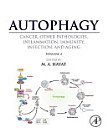Autophagy: Cancer, Other Pathologies, Inflammation, Immunity, Infection, and Aging: Volume 8- Human Diseases
M. A. Hayat
prosinec 2015 · Academic Press
E‑kniha
418
Stránky
family_home
Vhodná
info
reportHodnocení a recenze nejsou ověřeny Další informace
Podrobnosti o e‑knize
Volume 8 Autophagy and Human Diseases, concentrates on the role of Autophagy in human diseases, including tumorigenesis. The diseases discussed include melanoma, liver cancer, pancreatic cancer, and neurodegenerative disorders. Loss of autophagy in the central nervous system causes neurodegeneration (Alzheimers disease, Huntington's disease, Parkin's disease, and Amyotrophic Lateral Sclerosis). Melanoma is one of the most serious diseases in humans. Autophagy plays a key role in the anticancer response to Chemotherapy. However, autophagy can increase or decrease the effectiveness of chemotherapy. The reasons for these contradictory effects are explained. Autophagy also plays a role in idiopathic inflammatory diseases, infection, and immunity. An explanation is given how autophagy is closely linked to control of innate and adaptive immune responses in host defense in part by regulating cytokine production. The role of autophagy in cutaneous malignant melanoma is discussed in detail and expression of Beclin 1 and LC3 autophagic genes in melanoma is included to explain the molecular mechanisms underlying this very serious disease, which tends to metastasize to the brain. The effect of the treatment of this disease using Terfenadine through the induction of autophagy and apoptosis is also included. Autophagy and apoptosis are two main mechanisms involved in programmed cell death. - Presents the most advanced information regarding the role of the autophagic system in life and death and whether autophagy acts fundamentally as a cell survivor, or cell death pathway, or both - Introduces new, more effective therapeutic strategies, in the development of targeted drugs and programmed cell death, providing information that will aid on preventing detrimental inflammation - States recent advancements in the molecular mechanisms underlying a large number of genetic and epigenetic diseases and abnormalities
O autorovi
Dr. Hayat has published extensively in the fields of microscopy, cytology, immunohistochemistry, immunocytochemistry, and antigen retrieval methods. He is Distinguished Professor, Department of Biological Sciences, Kean University, Union, New Jersey, USA.
Ohodnotit e‑knihu
Sdělte nám, co si myslíte.
Informace o čtení
Telefony a tablety
Nainstalujte si aplikaci Knihy Google Play pro Android a iPad/iPhone. Aplikace se automaticky synchronizuje s vaším účtem a umožní vám číst v režimu online nebo offline, ať jste kdekoliv.
Notebooky a počítače
Audioknihy zakoupené na Google Play můžete poslouchat pomocí webového prohlížeče v počítači.
Čtečky a další zařízení
Pokud chcete číst knihy ve čtečkách elektronických knih, jako např. Kobo, je třeba soubor stáhnout a přenést do zařízení. Při přenášení souborů do podporovaných čteček elektronických knih postupujte podle podrobných pokynů v centru nápovědy.







